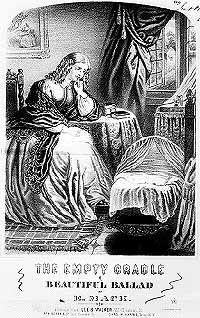 | |||
|
From their pulpits, Puritan preachers such as Cotton Mather cautioned their flocks that being "barren" meant God had cast a dark judgment upon them. In one sermon, Mather wrote: "Without your faith in Christ, No Good Fruit is to be expected from you, nor do I expect any good fruit [unless] you come to an Union with your Lord Redeemer." LISTEN
Other clergymen took a less less punitive view. According to social historian Margaret Marsh, these Puritan clergymen considered infertility God's test of faith. Marsh, who teaches history at Temple University and is co-author of "The Empty Cradle," Infertility in America, notes that many colonists saw heavenly designs in infertility. "For some of them, they said the Lord may choose not to give you children because he has a different purpose in mind for you," Marsh says. One way to prove your virtue was by taking in children from widows or poor families who could not feed all their youngsters. This practice was commonplace, even in the most celebrated families. After his father died, John Hancock -- that flamboyant signatory to the Declaration of Independence -- was raised by a wealthy, childless uncle and aunt as their own son. Part two: The Father of Our Country |

